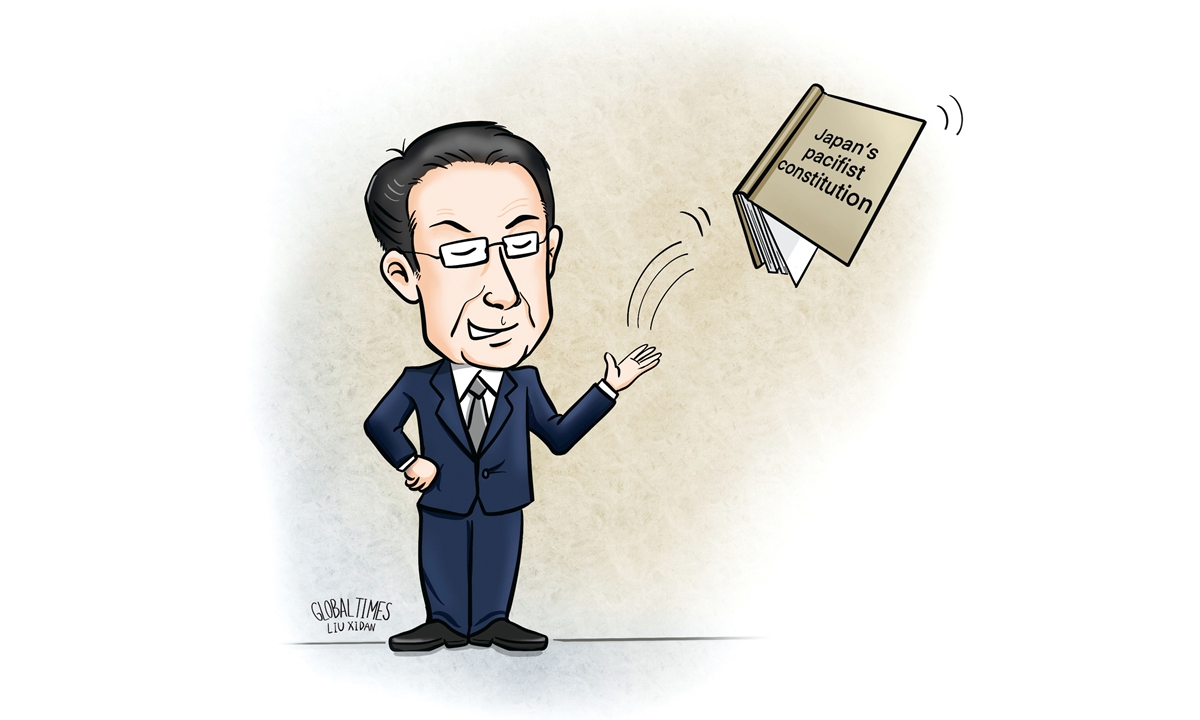
Illustration: Liu Xidan/GT
Japan and NATO hope to strengthen cooperation in space and cyberspace development to counter both China and Russia, Japanese media reported on Saturday. This is another recent close interaction between the two sides after NATO said it plans to open a liaison office in Japan and the Japanese prime minister is considering attending a NATO summit in July.Japan has become increasingly aggressive in recent years in seeking to break free from its postwar pacifism. It actively seeks to revise the constitution so as to exercise the right of collective self-defense, ignoring the exclusively defense-oriented policy and seeking to "acquire the capability to strike enemy bases." Last year, it also proposed for the first time to strengthen relations with "comrade countries who share its values."
It is evident that Tokyo is no longer content to stake its security on relations with Washington, and it is increasingly apparent that Japan's national security strategy and military strategy are becoming multilateralized. Japan is further following the NATO model based on the Japan-US alliance or simply trying to join it, establishing "comradeship" through bilateral and multilateral dialogues and colluding with Europe and the US to pursue an encirclement of China.
Japan's demand coincides with NATO's intention to strengthen ties with Asia-Pacific countries or even to create an "Asia-Pacific NATO" by hyping up regional tensions. The recent G7 Hiroshima summit witnessed Japan take the opportunity to actively showcase itself in order to cater to the US and Europe and try to expand the circle of influence of the Western camp. For Japan, a natural extension of cooperation with the G7 countries is largely cooperation with NATO.
US President Joe Biden said the G7 and NATO must "stay together" amid the Russia-Ukraine conflict that significantly increased NATO's presence in Europe and made the EU more dependent on the organization. Against this backdrop, NATO seeks to establish a liaison office in Japan, essentially preparing for the launch of the "Asia-Pacific NATO" that Japan leads.
Japan has been trying to woo NATO to contain China since the time of Shinzo Abe. In his speech at NATO headquarters in 2014, Abe played up the "China threat" while emphasizing that Japan and NATO are so-called "natural partners." The same year, the two sides signed the Individual Partnership and Cooperation Programme. After Fumio Kishida took office, he followed the footsteps of the US and Europe in imposing sanctions on Russia and increasing contacts with NATO, with one of the goals being to gain support from NATO in dealing with China. Japan's offensive capabilities rely heavily on the US. But in an era where the overwhelming military advantage of the US is increasingly weakened, Japan intends to develop its own military strength while also hoping to deepen its ties with other Western countries and NATO as another pillar to support Japan's absolute military advantage in Asia.
However, Japan's practice of inciting a "Taiwan emergency" and other instigations to cooperate with NATO's intervention in Asian affairs not only causes concern among peace-loving and rational people in Japan, but also seriously threatens the security and stability of East Asia and even the Asia-Pacific region, bringing more uncertainty to the regional situation. Japan's manipulation of issues related to China, in cooperation with the US and NATO's long-arm jurisdiction over Asian affairs and gross interference in China's internal affairs, seriously violates the purposes and principles of the UN Charter to maintain international peace and security.
In the face of heavy resistance to the amendment of Article 9 of the Japanese Constitution domestically, the Japanese government and right-wing forces are trying to hollow out the pacifist constitution. An important premise and basis for the existence of any military group is to set up hypothetical enemies, and deepening cooperation between Japan and NATO means that the two will have the same "enemy," and Japan is likely to participate in military actions against this "enemy." This will not only fundamentally violate the pacifist spirit, but also make Japan once again a hidden danger and root cause of military conflicts and threats to Asian security and stability.
This year marks the 45th anniversary of the signing of the Sino-Japanese Treaty of Peace and Friendship, but the Japanese government is contradicting itself by claiming that it hopes to build a constructive and stable relationship with China, while continuously forming alliances with Western countries to contain China. Japan, which is constantly teetering on a dangerous edge, is becoming an increasingly disruptive force and troublemaker for regional security and stability.
The author is a scholar at the Beijing Center for Japanese Studies of Beijing Foreign Studies University. opinion@globaltimes.com.cn

